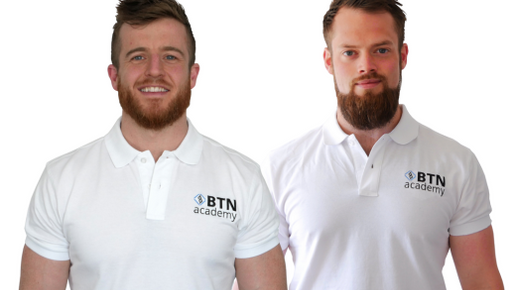
Values-aligned goal setting: The secret to success?
Posted on | Last updated 15-09-2021I was recently asked to explain what I thought made me good at what I do. That is staying balanced and providing good explanations for things when teaching, public speaking, podcasting, and the like. Now just for the record I hate answering questions like this because of huge amounts of Imposter Syndrome, but I’m working on that, and I was given no choice but to answer, so what I said was this:
"I still approach things like the 7-year-old child that asks “why?” all the time"
I intentionally do this because I think it’s a great approach to almost everything, but it's an especially good idea in a lot of coaching settings. To illustrate that I’m going to talk to you about a really effective method of goal setting, either for yourself or someone you’re working with. It called the 7 whys technique. It’s something that was apparently created in a Toyota car factory, or so the story goes. It probably existed before then, to be honest, it's not all that complex of an idea, but it doesn't really matter.
The ‘7 whys’ is exactly what it sounds like, you ask why, then ask another 6 why questions. Importantly you don't just ask why, though, you ask a why question. This is a critical detail because the aim here isn't to undermine your thoughts or anyone else's, it's not an exercise in critique or dismissal, it's an exercise in exploration. In digging deeper to understand the underlying thought that exists beneath the things you say, think, and believe.

Let's take a peek at what this looks like in a goal-setting scenario. You can do this with someone else, but I'd definitely recommend you also do it with yourself, too. It’s good to know your own beliefs and of course, practice makes perfect.
Note that the questions and answers below are written in a straight-forward manner to save space. In a real setting it's important to communicate in a way that’s a little less blunt than this!
Communication is a whole blog (or, let’s be honest, book) of its own but very simply it’s useful to:
- First repeat the client's answer back to them, reworded. This allows them to feel heard and allows you to clarify that you understand.
- Affirm their thoughts and beliefs before asking a question so that they feel safe to share things with you. “It’s totally understandable that you feel that way, it’d be weird if you didn’t!”. That kind of thing.
- Ask if they’re happy for you to explore this a little (maybe don’t do this every time to avoid it being a weird conversational flow, but you get the picture).
On to the example, based on a conversation I had less than a week ago with a new client. Of course, there are almost endless amounts of alternative questions you could ask at each stage but the principle is the same:
Question: What's your goal?
Answer: I want to lose weight.
Many times, we stop here, and start looking to specify amounts of weight lost, timeframes, and so on. There’s nothing wrong with this per se, but as you’ll see it often misses the bigger picture.
Follow Up Question 1: Why do you want to lose weight?
Answer: I want to lose weight because at the moment I don't feel good about myself.
Follow Up Question 2: Why do you feel that losing weight will make you feel better about yourself?
Answer: Because I hate the way that I look, and so if I looked different, I’d feel better about myself.
Follow Up Question 3: Why does the way that you look affect the way that you feel about yourself in general?
Answer: Because I don't feel happy when I look in the mirror and it’s hard to think about other things when that’s always there.
4: Why do you need to lose weight in order to feel happy about what you see in the mirror?
Because I used to like my body and now it's changed and I don't like it anymore, so I want it to look like it used to.
5: Why do you feel that you're unable to be happy until you've changed your body shape to look more like it did at another time?
I don't know, I just used to feel really happy and confident before [life event that led to weight gain - usually a child, a breakup, or some other significant thing].
6: It sounds like a lot changed around that time, why do you think it's the weight gain specifically that led you to feel so down about yourself?
Because I don't feel attractive to my partner anymore.
7: Why do you feel that your partner doesn't find you attractive anymore?
This then leads into relationship issues, which we as coaches can't resolve, but we can at least understand.
This conversation is far from unique, and I can imagine that a lot reading it will find it both quite surprising and yet at the same time the least surprising thing in the world. To be clear there are a ton of other ways you could approach this exact example, too, for example doubling down on why the person’s appearance in the mirror (which is dictated by two things – how you actually look, and how you feel about how you look, both of which can change independently) is affecting their mood so much.
Why this kind of process matters is that it informs our goal setting strategies in a way that radically changes the focus or reason for seeking a given outcome. In many cases it even changes the desired outcome itself. Here we have a client who ostensibly desired weight loss, but upon investigating actually it was the case that they were experiencing issues within their relationship because of life events that had happened over a few years and (upon further discussion) what they actually wanted was an increase in self-confidence and self-esteem. This involved:
- Speaking to their partner honestly and openly.
- Finding a meaningful thing that they could progress towards and that helped them feel healthier along the way (they're doing a Tough Mudder with friends and so training for that).
- Eating in a more mindful, intentional way so that they felt in charge of their own choices and were able to make decisions that benefitted their day-to-day sense of wellbeing.
- Improving their body awareness and starting to question negative self-talk, along with challenging their pre-existing conceptions about their value as a person, independent of their body’s size and shape.
In short, this person felt that they weren't an active participant in life. That their life was just happening to them, and so they had no control. Whether they thought that they simply wanted weight loss because taking control of your body size is easier than taking control of harder things like relationships and self-worth, because losing weight and self-restriction is an act of self-punishment for not being ‘enough’, because they genuinely believed that was the issue, or any number of other things/combinations of things, I have no idea.

But what I do know is that weight loss wouldn't have helped them as much as everything else will, and this is often the case with people who seek goals such as this. It’s a proxy-goal at most, and so not something that will really lead them to the thing they want, or it won’t take them as close as they think it will, at least not in isolation. This means that the person will be working towards something that isn’t going to lead them to the outcomes they truly desire, which will be a problem when temptation strikes.
Because why would you strive hard for a goal you don’t actually value?
There are two main take-homes here:
1 - Weight loss is often not the only goal a client has. To be clear, often it’s at least part of it – and it's a grand goal to have with a ton of potential health benefits - but we need to investigate it (whether for a client or for ourselves) because if we don’t, we'll never know what else really matters to someone and so what motivates them.
2 - In cases where weight loss isn't the goal, there is still a massive role for a coach, or for changes in your own nutrition and exercise. Lifestyle related changes can do so much more for you than simply changing your waist circumference if you want them to. So we as fitness folks would benefit a ton by thinking more laterally about this. If we focus on only body composition we miss a ton of the wider picture.
Want to learn more about what nutrition coaching can do for you and your clients?
The BTN Practical Academy starts again in less than 10 weeks, and you can sign up NOW to secure your place.
Just head HERE for more information, or if you'd like to chat about it click HERE to book a call with me. Speak soon!
And thank you for reading,
Tom.
Our Nutrition Podcast

Join Tom and Ben from BTN on Ben Coomber Radio to learn all about nutrition, performance, health, and the latest science. A mix of guest and co-hosted shows. You'll learn a ton.
Listen now